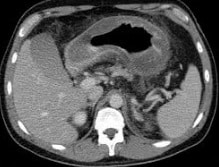In Greek is where we find the etymological origin of the term that concerns us now. Specifically, it is the result of the sum of two lexical components of said language:
-The noun "gaster", which can be translated as "stomach" or "belly".
-The suffix "-itis", which is used to indicate "inflammation."
Hence we can literally indicate that gastritis is an inflammation of the stomach.
Gastritis is the swelling of the stomach (the widest sector of the digestive system, which is between the intestine and the esophagus). Specifically, gastritis involves inflammation of the stomach or gastric mucosa , which is the layer that lines the interior walls of the stomach.
 The possible causes of gastritis are varied. The disorder can be caused by a bacterial infection, an unbalanced diet , an autoimmunity problem, or stress , for example.
The possible causes of gastritis are varied. The disorder can be caused by a bacterial infection, an unbalanced diet , an autoimmunity problem, or stress , for example.
However, we cannot ignore that there are other elements that can also cause gastritis. We are referring to excessive alcohol consumption, the intake of drugs such as naproxen or ibuprofen, the consumption of cocaine, the intake of very spicy foods and even a viral infection.
Once it occurs in the body, gastritis can cause stomach pain , heartburn , nausea and vomiting . The person who suffers from this problem usually becomes indigestible when eating or loses their appetite .
Black stools, vomiting in which blood is perceived or even a considerable increase in gas are other symptoms that those suffering from gastritis may suffer.
The study known as gastroscopy, upper gastrointestinal endoscopy or esophagogastroduodenoscopy allows visualization of gastritis, since the area appears red due to irritation or small hemorrhages. A biopsy may also be performed. With the diagnosis confirmed, the doctor will be in charge of indicating treatment that may include the administration of drugs and the prescription of an appropriate diet.
Gastritis generally begins to improve with the start of treatment, although the outlook depends on the underlying cause. In many cases, gastritis does not even produce symptoms and, therefore, does not affect the individual. In any case, there are certain complications that can occur with this disorder, such as an increased risk of gastric cancer or blood loss.
Depending on its characteristics, a distinction can be made between chronic gastritis and acute gastritis . According to the evolution , meanwhile, one can speak of atrophic gastritis or erosive gastritis .
Atrophic gastritis, which is usually caused by the Helicobacter pylori bacteria, can be established when the protective layer of the stomach is severely damaged and there is a risk of suffering from stomach cancer. For its part, erosive gastritis is what occurs when there is an ulceration in the stomach mucosa.
In order to prevent suffering from gastritis, it is necessary to carry out measures such as not consuming too much alcohol, avoiding prolonged intake over a period of the drugs that we have already mentioned or eating a healthy, complete and balanced diet.
